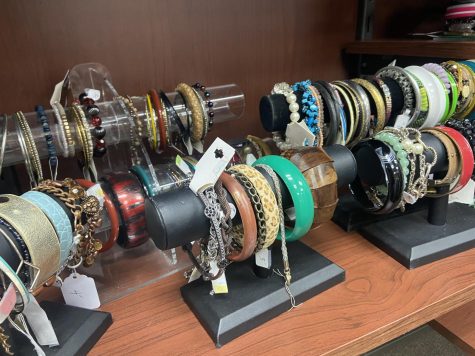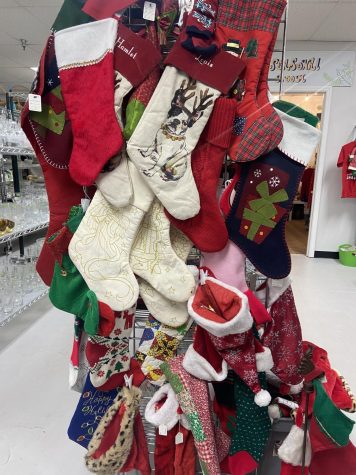Avoiding Fast Fashion: How To Be Environmentally Conscious for the Holidays
Reuse gift bags and wrap. It may sound tacky, but every year parents fill an entire garbage bag with the reminisce of Christmas morning. So, try to salvage some!
During the Holiday season, students buy a lot of gifts for their friends and family. In order to get the most out of their minimum wage paychecks, teenagers shop at stores that produce clothing for a cheaper price. Shein, Romwe, Forever 21, H&M, and Zara are all brands that many are drawn to for their trendy and inexpensive clothing. Yet, a majority of popular stores are considered fast fashion and have a detrimental effect on the world.
What is fast fashion?
Fast fashion is the term used to describe clothes that are made and sold cheaply, so people can frequently buy new clothes to replace the not-so-old clothes they recently bought. Basically, companies have started producing clothing rapidly, so that they and their buyers can keep up with the latest trends, leading to a cycle of unconscious consumerism.
Dave Krodel, a science teacher at Glenbard East shared his opinion on the problematic cycle of fast fashion. “What is the messaging that comes from fast fashion to especially the young people of today? I mean, when you see things constantly changing, how able are you to go out and buy a new outfit every two months or four months every season?” Krodel continued. “I mean, maybe some people can do that. What do you do with the old clothes? Where do they go? Do they go to a landfill? Do they wind up in a waste area somewhere?”
Why is fast fashion bad?
Though it is appealing to get the latest trends for cheap, a majority of the clothing produced is thrown out. People purchase an item and it is in style for about a month, then they throw it out when it is not trendy anymore, then return to their favorite store to purchase the latest trend.
Since clothing is acquired so easily, this cycle keeps repeating. According to “10 Stunning Fast Fashion Statistics” by Martina Igini, 92 million tons of clothing end up in landfills each year, which is the same as an entire garbage truck full of clothing getting thrown out every second. A majority are produced overseas, where regulations are very relaxed.
Factory workers at the company Zara are paid between 3 and 4 dollars each day, working at least 11 hours per day, states ImpactPolicies.com. Working conditions are awful and many people in these factories contract respiratory illnesses from being around dangerous chemicals all day long. Unnecessary amounts of water are used, along with depleting many other non-replenishable resources.
Mr. Krodel shared what waste does, specifically to the environment. “Waste can result in detriment or damage to the environment. It can destroy the environmental quality,” said Krodel. “I mean, whether it’s some type of toxic waste product left over from refineries or from the processing of the material, the fact is once that contaminates the soil, the water or the air, those are not resources that we can reuse”
Though he does teach science-focused classes, Krodel brought up the social aspect of fast fashion when asked about its effect on society.
People, especially teenagers, feel compelled to conform to a certain trend, which often can feed into social anxiety.
“I think I worry about the social stigma of fast fashion. What’s the message that comes to our young people? And I say this as a father of two daughters, not so much my son, but my daughter’s. What is the impact on their self-image of fast fashion at the end of the day? They try to aspire to reach some ideal image that’s put out in an advertisement because they’ll never get there, but that somehow drives their self-worth. That’s dangerous. The whole environmental piece of it aside, it’s the social consequence I wonder about, too” he said.
How can you help?
These effects do seem extremely dramatic, and though they are serious, there are ways you can help. Doing something is better than doing nothing. Most shoppers aren’t aware of the effects fast fashion has, but it is important to make conscious and educated decisions this holiday season.
Instead of purchasing a lot of cheaper gifts, try to buy items that will most likely last longer.
Purchasing edible gifts, such as candy and cookies is a great idea.
Reuse gift bags and wrap. It may sound tacky, but every year parents fill an entire garbage bag with the reminisce of Christmas morning. So, try to salvage some!
Shop secondhand. Most people are huge advocates for only giving away new items, but you can actually find some pretty cool items at the thrift store. You can even make a fun day of it, searching through items and trying them on. Gifts are often donated if they can’t be returned. If you receive an unwanted gift and are unable to return it, pass it on to a thrift store where it can live up to its fullest potential.

Lombard is home to the popular Purple Manatee Resale shop. They specifically highlight on their website that their “mission is to reduce landfill waste, and put books, clothes, and toys in the hands of those that need them”. One of their employees, Maddie Wells, explains what the holidays look like at the shop.
“We have an entirely new with tags section. They’re very festive, it’s very busy. I worked a few days before Halloween and everyone dressed up and a lot of people came in for costumes. People come in to buy decorations,” she said. “We have an entire room full of Christmas stuff. A lot of people buy Christmas sweaters and ornaments.”

So, shop smart this holiday season. Whether it’s the social or environmental effect, fast fashion does affect everyone. You don’t have to cut off all of your favorite brands but make small changes. Get family and friends to as well. Many people making a tiny change can make a big difference.

This is Kaitlin's second year on the Echo as a senior! She is in choir, tennis, theater, and student council. Outside of school, she loves to read, bake,...



